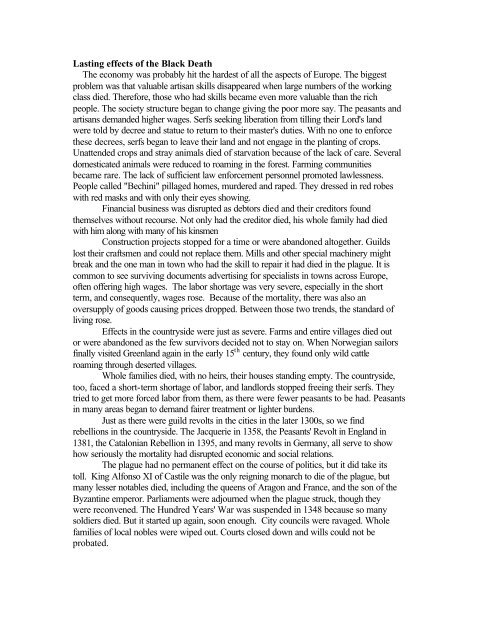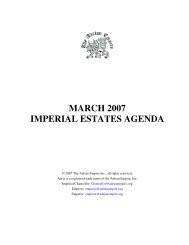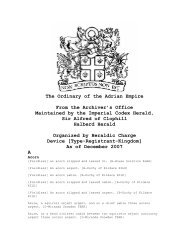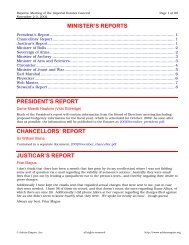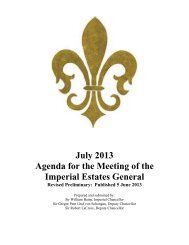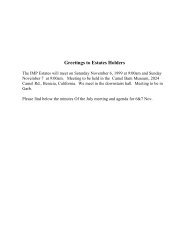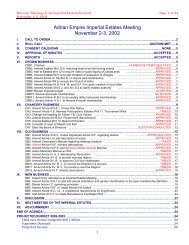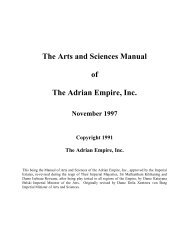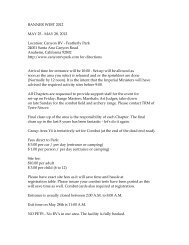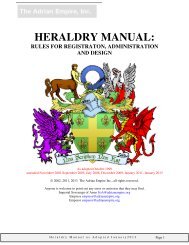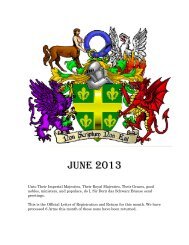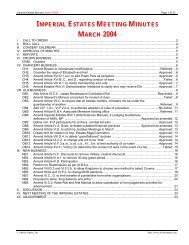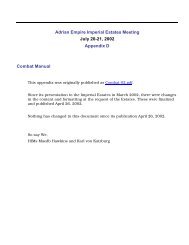Research Paper on the Black Death - Back to Main Page
Research Paper on the Black Death - Back to Main Page
Research Paper on the Black Death - Back to Main Page
Create successful ePaper yourself
Turn your PDF publications into a flip-book with our unique Google optimized e-Paper software.
Lasting effects of <strong>the</strong> <strong>Black</strong> <strong>Death</strong><br />
The ec<strong>on</strong>omy was probably hit <strong>the</strong> hardest of all <strong>the</strong> aspects of Europe. The biggest<br />
problem was that valuable artisan skills disappeared when large numbers of <strong>the</strong> working<br />
class died. Therefore, those who had skills became even more valuable than <strong>the</strong> rich<br />
people. The society structure began <strong>to</strong> change giving <strong>the</strong> poor more say. The peasants and<br />
artisans demanded higher wages. Serfs seeking liberati<strong>on</strong> from tilling <strong>the</strong>ir Lord's land<br />
were <strong>to</strong>ld by decree and statue <strong>to</strong> return <strong>to</strong> <strong>the</strong>ir master's duties. With no <strong>on</strong>e <strong>to</strong> enforce<br />
<strong>the</strong>se decrees, serfs began <strong>to</strong> leave <strong>the</strong>ir land and not engage in <strong>the</strong> planting of crops.<br />
Unattended crops and stray animals died of starvati<strong>on</strong> because of <strong>the</strong> lack of care. Several<br />
domesticated animals were reduced <strong>to</strong> roaming in <strong>the</strong> forest. Farming communities<br />
became rare. The lack of sufficient law enforcement pers<strong>on</strong>nel promoted lawlessness.<br />
People called "Bechini" pillaged homes, murdered and raped. They dressed in red robes<br />
with red masks and with <strong>on</strong>ly <strong>the</strong>ir eyes showing.<br />
Financial business was disrupted as deb<strong>to</strong>rs died and <strong>the</strong>ir credi<strong>to</strong>rs found<br />
<strong>the</strong>mselves without recourse. Not <strong>on</strong>ly had <strong>the</strong> credi<strong>to</strong>r died, his whole family had died<br />
with him al<strong>on</strong>g with many of his kinsmen<br />
C<strong>on</strong>structi<strong>on</strong> projects s<strong>to</strong>pped for a time or were aband<strong>on</strong>ed al<strong>to</strong>ge<strong>the</strong>r. Guilds<br />
lost <strong>the</strong>ir craftsmen and could not replace <strong>the</strong>m. Mills and o<strong>the</strong>r special machinery might<br />
break and <strong>the</strong> <strong>on</strong>e man in <strong>to</strong>wn who had <strong>the</strong> skill <strong>to</strong> repair it had died in <strong>the</strong> plague. It is<br />
comm<strong>on</strong> <strong>to</strong> see surviving documents advertising for specialists in <strong>to</strong>wns across Europe,<br />
often offering high wages. The labor shortage was very severe, especially in <strong>the</strong> short<br />
term, and c<strong>on</strong>sequently, wages rose. Because of <strong>the</strong> mortality, <strong>the</strong>re was also an<br />
oversupply of goods causing prices dropped. Between those two trends, <strong>the</strong> standard of<br />
living rose.<br />
Effects in <strong>the</strong> countryside were just as severe. Farms and entire villages died out<br />
or were aband<strong>on</strong>ed as <strong>the</strong> few survivors decided not <strong>to</strong> stay <strong>on</strong>. When Norwegian sailors<br />
finally visited Greenland again in <strong>the</strong> early 15 th century, <strong>the</strong>y found <strong>on</strong>ly wild cattle<br />
roaming through deserted villages.<br />
Whole families died, with no heirs, <strong>the</strong>ir houses standing empty. The countryside,<br />
<strong>to</strong>o, faced a short-term shortage of labor, and landlords s<strong>to</strong>pped freeing <strong>the</strong>ir serfs. They<br />
tried <strong>to</strong> get more forced labor from <strong>the</strong>m, as <strong>the</strong>re were fewer peasants <strong>to</strong> be had. Peasants<br />
in many areas began <strong>to</strong> demand fairer treatment or lighter burdens.<br />
Just as <strong>the</strong>re were guild revolts in <strong>the</strong> cities in <strong>the</strong> later 1300s, so we find<br />
rebelli<strong>on</strong>s in <strong>the</strong> countryside. The Jacquerie in 1358, <strong>the</strong> Peasants' Revolt in England in<br />
1381, <strong>the</strong> Catal<strong>on</strong>ian Rebelli<strong>on</strong> in 1395, and many revolts in Germany, all serve <strong>to</strong> show<br />
how seriously <strong>the</strong> mortality had disrupted ec<strong>on</strong>omic and social relati<strong>on</strong>s.<br />
The plague had no permanent effect <strong>on</strong> <strong>the</strong> course of politics, but it did take its<br />
<strong>to</strong>ll. King Alf<strong>on</strong>so XI of Castile was <strong>the</strong> <strong>on</strong>ly reigning m<strong>on</strong>arch <strong>to</strong> die of <strong>the</strong> plague, but<br />
many lesser notables died, including <strong>the</strong> queens of Arag<strong>on</strong> and France, and <strong>the</strong> s<strong>on</strong> of <strong>the</strong><br />
Byzantine emperor. Parliaments were adjourned when <strong>the</strong> plague struck, though <strong>the</strong>y<br />
were rec<strong>on</strong>vened. The Hundred Years' War was suspended in 1348 because so many<br />
soldiers died. But it started up again, so<strong>on</strong> enough. City councils were ravaged. Whole<br />
families of local nobles were wiped out. Courts closed down and wills could not be<br />
probated.


